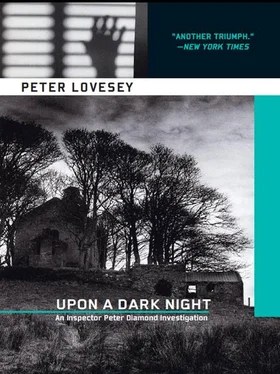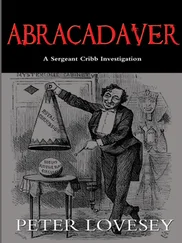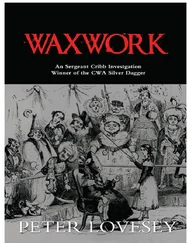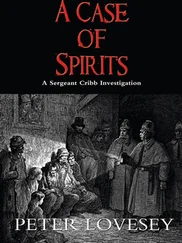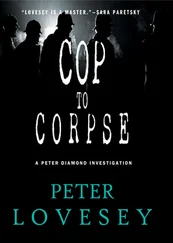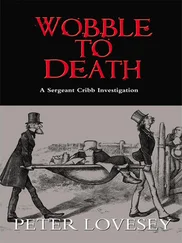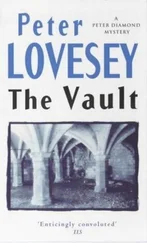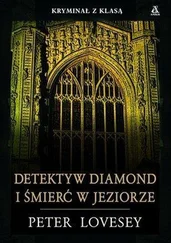‘Stoking up,’ he said. ‘Heavy session in prospect.’
It was almost eight when Julie got back to the nick.
‘Have you eaten?’ he asked her first.
‘Not since lunch.’
‘Why don’t we go across to Bloomsburys? I don’t think I can face the canteen tonight.’ Coming from a man who was a credit to the police canteen, it was a betrayal. What a good thing the manageress didn’t hear him.
Julie said, ‘On one condition: that you stay off the beer.’ Seeing his eyes widen at that, she explained, ‘No disrespect, but you’ve had enough for one day if you’re driving home after.’
‘How do you know that?’
Her slightly raised eyebrows said enough.
Bloomsburys Cafe-Bar was their local, just across the street from the nick, a place with bewildering decor that amused Diamond each time he came in. Pink and green dominated and the portraits of Virginia Woolf and members of the Bloomsbury Set co-existed with non-stop TV and plastic tablecloths, lulled by rock ballads and the click of billiard balls from the games room behind the bar.
They chose a round table in a window bay. Diamond circled it first, assessing the fit of the chairs. On previous visits he’d discovered a variation in size, although they were all painted pale green. A big man had to be alert to such things. While Julie started on a chicken curry with rice and poppadom, he sampled the apple pie and custard, stared at the Diet Coke in front of him and brought her up to date on his long afternoon, recalling how he handled the shotgun, examined the church registers at Tormarton and gave advice on women to a detectorist. Unusually, he went to some trouble to explain how each experience had an impact on their investigations. In total, he said, it had been a satisfactory afternoon – and how was it for her?
Less exciting, she told him. She had started, as per instructions, by visiting Imogen Starr, the social worker, and questioning her about Doreen Jenkins, the woman who had collected Rose. In Imogen’s opinion, Jenkins was an intelligent and well-disposed woman, concerned about Rose and well capable of caring for her.
‘Ho-hum,’ commented Diamond. ‘Did you get a description from her?’
‘A good one. I’ll say that for Imogen: she’d make a cracking witness. She puts the woman’s age at thirty or slightly younger. Height five-eight. Broad-shouldered. Healthy complexion. Regular, good-looking features, but with large cheek-bones. Good teeth, quite large. Brown eyes. Fine, chestnut brown hair worn in a ponytail. She was beautifully made-up, face, nails, the lot. White silk blouse, black leggings, black lace-up shoes. Oh, and she had a mock-leather jacket that she put on at the end and one of those large leather shoulder-bags with a zip.’
‘Accent?’
‘Home counties. Educated.’
‘Your memory isn’t so bad either. I take it that Imogen hasn’t changed her opinion about this elegant dame?’
‘She still believes Rose is in good hands.’
He clicked his tongue in dissent. ‘And I told her myself that the Hounslow address is false.’
‘She thinks it quite feasible that the family wanted to protect Rose from the press.’
‘Talk about Starr. Starry-eyed,’ he said.
‘Inexperienced,’ said Julie.
Doreen Jenkins’s integrity had unravelled as Julie had got on the trail, phoning around and checking the information. None of it had stood up to examination. Nothing was known of the family in Twickenham or Hounslow, nor of Jackie Mays, the friend who had been mentioned. Rose’s mother was supposed to have got a divorce and remarried in 1972. A check of all the marriages that year of men named Black had failed to link any with a woman whose surname was Jenkins.
Doreen Jenkins and her partner Jerry were supposed to have been staying at a bed and breakfast place in Bathford. Not one of the licensed boarding houses could recall a couple staying that week and being joined later by someone of Rose’s name or description.
‘Ada Shaftsbury was right all the time,’ Julie summed up. ‘This woman was lying through her teeth.’
‘Except for the photos,’ he said. ‘They must have been genuine to have convinced Ada as well as Imogen. They definitely showed Rose with an older woman.’
‘I’d be more impressed if they’d shown Doreen Jenkins in the same picture.’
‘You doubt if she’s the stepsister?’
‘Having spent this afternoon the way I did, I doubt everything the bloody woman said.’
Hunched over the drink, which he was taking in small sips like cough medicine, he said, ‘Why then? Why all the subterfuge?’
Julie shook her head, at a loss. ‘I spent the last two hours with Ada, going over everything again.’
‘With Ada?’
She nodded.
He shook his head. ‘You need a socking great drink.’
‘And some.’
‘I’ll join you.’ He closed his eyes and downed the last of the Diet Coke.
‘In that case,’ she said, ‘make it Diet Cokes for both of us.’
His mouth may have turned down at the edges, but he didn’t protest. Meekly he stepped back to the bar and when he returned with the drinks he told her, ‘Yours has vodka added.’
She said, ‘They look the same to me.’
‘Colourless, isn’t it?’ He took a long swig of his. ‘Now, Julie, I want to try out a theory on you. If it holds up, we may have a suspect for Gladstone’s murder.’
Rain turning to sleet, sweeping in on an east wind, rattled the metal-framed windows of the Manvers Street building as Diamond briefed the murder squad. It was nine-twenty on Wednesday morning. Sixteen of them had assembled, most in their twenties, in leather and denim, the ‘plain-clothes’ that is almost a CID uniform, their hair either close-cropped or overlong. John Wigfull, the only suit in the room, sat slightly apart, closest to the door. Behind Diamond was a display board with a map of north-east Avon showing Tormarton Farm marked with a red arrow. There were several eight-by-ten photos of the scene inside the farmhouse, the corpse slumped in an armchair, the back of the head blown away, the shotgun lying on the floor. That same gun in its transparent wrapping lay across a table. Already this morning Diamond had demonstrated the impossibility of Daniel Gladstone’s ‘suicide’. He had talked about the digging on the farm at Tormarton and the possible motive of theft. Now he turned to another incident.
‘Monday, October 3rd, about six-thirty. An elderly couple called Dunkley-Brown are driving back from Bristol to Westbury on the M4. At Junction Eighteen…’ He took a step towards the map and touched the point. ‘…they decide to take a detour through Bath to collect a Chinese takeaway. They start down the A46 and after maybe three-quarters of a mile – before Dyrham, anyway – they are forced to brake. A young woman has wandered into the road. They can’t avoid hitting her, but they think they’ve avoided a serious accident. She fell across the bonnet. But when they go to help her it’s clear that she’s lost consciousness. They try to revive her at the side of the road. This is a real dilemma for them because the man has endorsements for drunk driving and he’s had a few beers during the day. They don’t want to be identified. What they do is this: drive her to the nearest hospital, a private clinic, here…’ He touched the map again. ‘…the Hinton Clinic – and dump her unconscious in the car park. But they are seen leaving the hospital and they have a Bentley with a distinctive mascot, and that’s how we know as much as we do.
‘The woman is found and taken into the hospital still in a coma and at this point it becomes a police matter. We send someone to the Hinton, but without much result, because although the patient is nursed back to consciousness, she is apparently suffering from a total loss of memory about her past, everything leading up to and including the accident. However, her physical injuries amount to no more than a cracked rib and some bruising and she’s handed over to Bath Social Services. We send a photographer to get some pics of the damage. Screen, please.’
Читать дальше
